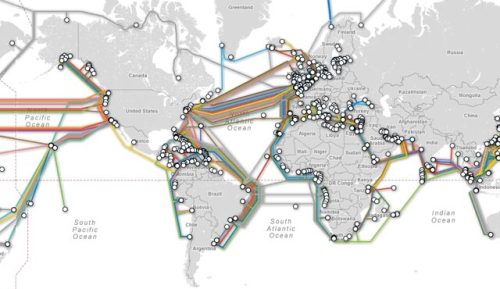
A submarine cable is about 0.75 to 2.5 inches in diameter, or about the thickness of three ordinary garden hoses. The longest cable, called the Southern Cross, runs under the Pacific, stretching 18,500 miles.
Business
Survey: 60% of consumers are banner blind
A Problem Google Has Created for Itself
Entertainment
The 40 Hottest Women in Tech
Let's build a ship - Timelapse builds the world's largest ship in 70 seconds Building the world's largest ship - the Maersk Tripple E
World Wide Maze is a "Chrome Experiment" that turns any website or search into a playable three-dimensional "Monkey Ball"-style maze game. You can control via the keyboard or link to your phone to turn it into a tilt-sensitive remote control. (Chrome browser only, obviously.)
Gadgets
Apple looks to protect dropped iPhones by shifting their orientation mid-flight
Canon Unveils the Rebel SL1, the World’s Smallest and Lightest DSLR
Electronic Devices on Planes: Is the madness nearly over?
Why You'll End Up Wearing a Smart Watch
Internet
Godspeed, Google Reader
How Google went from essential to evil in one short week TeleRead: News and views on e-books, libraries, publishing and related topics
Reading & Discussion
The Copyright Rule We Need to Repeal If We Want to Preserve Our Cultural Heritage
The Glory Days of American Journalism. Ignore the doomsayers: The news-reading public has never had more and better information at their fingertips.
Supreme Court Rules on Bookselling Suit
Science
Does studying science make you a better person? Study shows that people who study science are more likely to condemn unethical behavior than religious people
The Nielsen Family Is Dead. Nielsen Now Tracks (Almost) Everything You Buy: Credit, Debit and Bank Data Now Combined With TV, Online Viewing. Nielsen Offers Focus on ‘Zero-TV’ Homes. Nielsen Agrees to Expand Definition of TV Viewing. The 23,000 U.S. homes Nielsen currently samples are going to see some changes this year.
Software
The Commotion Wireless Project is a free, open-source (but still early beta) software platform for creating decentralized wireless mesh networks. The Open Technology Institute (part of the nonprofit New America Foundation) has just announced the developer release of Commotion, a free, open-source software project for building decentralized, ad hoc community networks of wireless devices. The goal of the project is both to bridge the digital divide and to enable those without uncensored internet access to roll their own networks and circumvent repressive internet censorship and telecommunication shutdowns. Commotion is currently being field-tested in Detroit (in collaboration with the Detroit Digital Justice Coalition) to bridge the digital divide in 48217 (one of Detroit's most impoverished neighborhoods) and in the Cass Corridor.
No comments:
Post a Comment